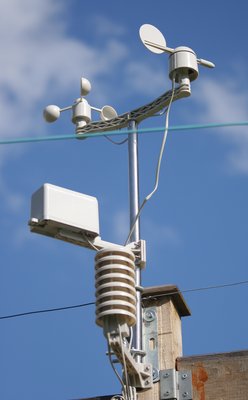
pywws
Python software for USB Wireless Weather Stations.
pywws is a collection of Python modules to read, store and process data from popular USB wireless weather stations such as Elecsa AstroTouch 6975, Watson W-8681, WH-1080PC, WH1080, WH1081, WH3080 etc. I assume any model that is supplied with the EasyWeather Windows software is compatible, but cannot guarantee this.
The software has been developed to run in a low power, low memory environment such as a Raspberry Pi. It can be used to create graphs and web pages showing recent weather readings, typically updated every hour. It can also send “live” data to services such as Weather Underground and post messages to Twitter.
- The development version of pywws is hosted on GitHub.
- “Snapshot” releases of pywws are available from the Python Package Index (PyPI).
- Documentation is hosted on Read the Docs.
- Documentation is available in the following languages (the non-English versions are not complete or up to date):
I have written this software to meet my needs, but have tried to make it adaptable to other people’s requirements. You may want to edit some or all of the modules, or write some new ones, to get it to do exactly what you want. One of the reasons for using Python is that it makes such alterations so easy. Don’t be afraid, just jump in and have a go.
Requirements
The software needed to run pywws depends on what you plan to do with it. You’ll need some of the following.
Essential: Python 2.7 or 3 (also see legacy version below).
Essential: USB library python-libusb1 or PyUSB or, for MacOS, hidapi and a Python interface to it.
Graph drawing: gnuplot.
Secure uploading to your web site: Paramiko.
Posting to Twitter: python-twitter or Tweepy.
Posting to other web services: python-requests.
For more detail, see the documentation - dependencies.
Legacy version
If for some reason you are stuck with Python 2.5 or 2.6 a “legacy branch” of pywws can be installed with pip and is available on GitHub. The most recent version of this branch is 18.4.1.
Documentation for the legacy version is also available on Read the Docs: http://pywws.readthedocs.io/en/legacy/
Installing and upgrading pywws
pywws can be installed directly from the Python Package Index (PyPI) using the pip command. See How to get started with pywws for full instructions.
Documentation
Documentation is included with pywws downloads, and is also available online. A good starting place is How to get started with pywws which describes in more detail how to install pywws.
If you have questions not answered in the documentation, please join the pywws Google mailing list / discussion group and ask there. Note that your first message to the group will not appear immediately – new posters have to be approved by a moderator, to prevent spam messages.
Contents
- Dependencies
- User guides
- How to get started with pywws
- How to set up ‘hourly’ logging with pywws
- How to set up ‘live’ logging with pywws
- How to integrate pywws with various weather services
- How to use pywws in another language
- weather.ini - configuration file format
- status.ini - status file format
- Understanding pywws log files
- Humidity Index (Humidex)
- Python modules
- Licence
- pywws Contributors
- Change log
Indices and tables
Credits
I would not have been able to get any information from the weather station without access to the source of Michael Pendec’s “wwsr” program. I am also indebted to Dave Wells for decoding the weather station’s “fixed block data”.
Last of all, a big thank you to all the pywws users who have helped with questions and suggestions, and especially to those who have translated pywws and its documentation into other languages.
Legalese
This program is free software; you can redistribute it and/or modify it under the terms of the GNU General Public License as published by the Free Software Foundation; either version 2 of the License, or (at your option) any later version.
This program is distributed in the hope that it will be useful, but WITHOUT ANY WARRANTY; without even the implied warranty of MERCHANTABILITY or FITNESS FOR A PARTICULAR PURPOSE. See the GNU General Public License for more details.
You should have received a copy of the GNU General Public License along with this program; if not, write to the Free Software Foundation, Inc., 51 Franklin Street, Fifth Floor, Boston, MA 02110-1301 USA
Comments or questions? Please subscribe to the pywws mailing list http://groups.google.com/group/pywws and let us know.